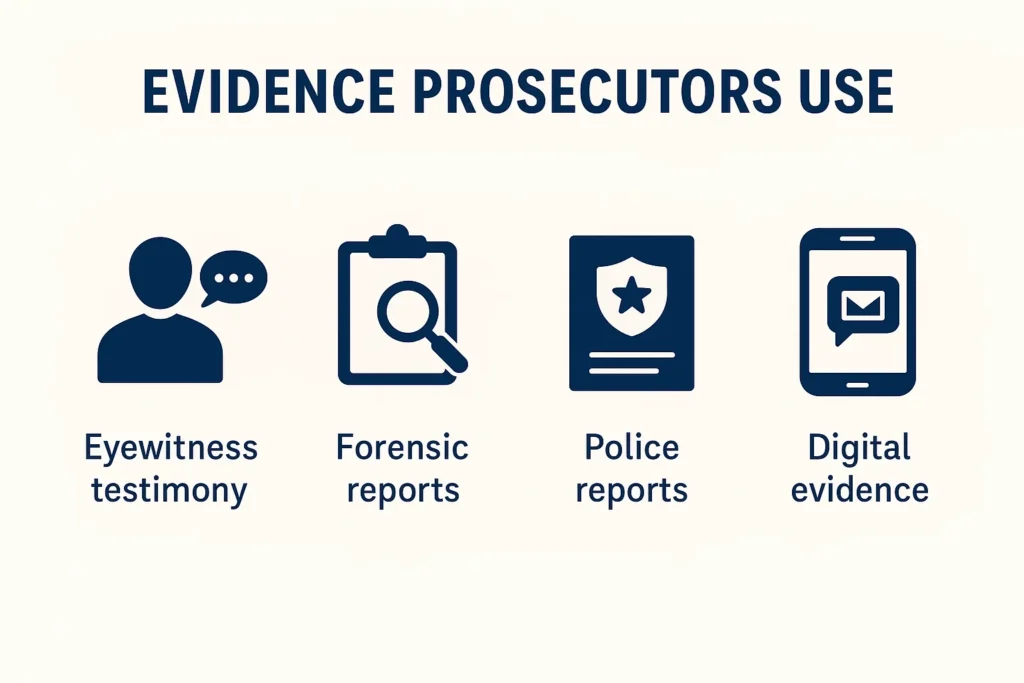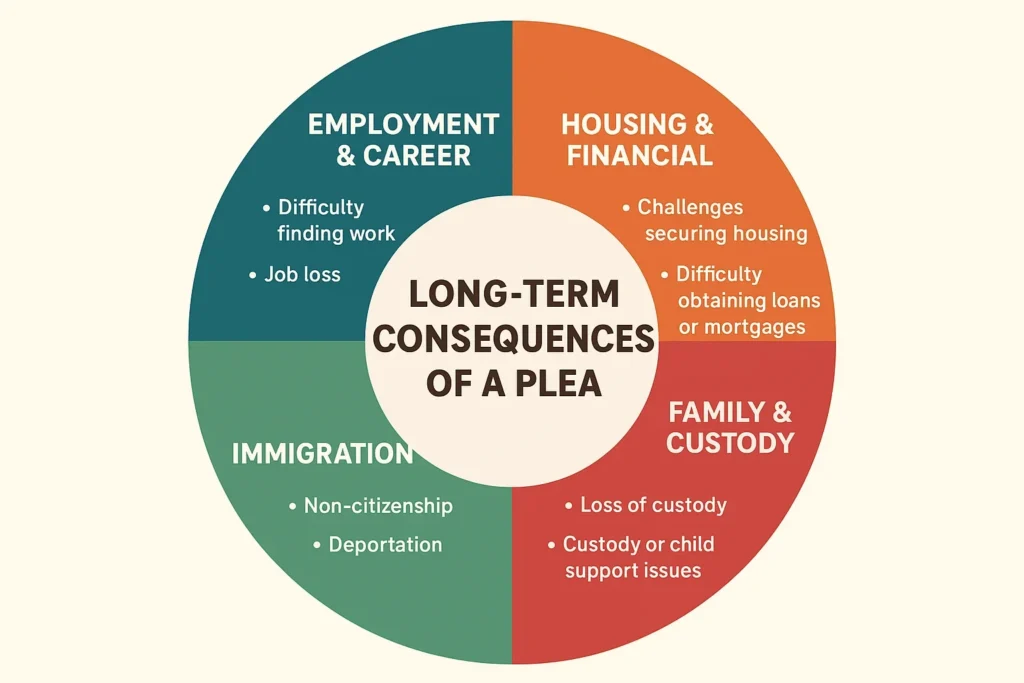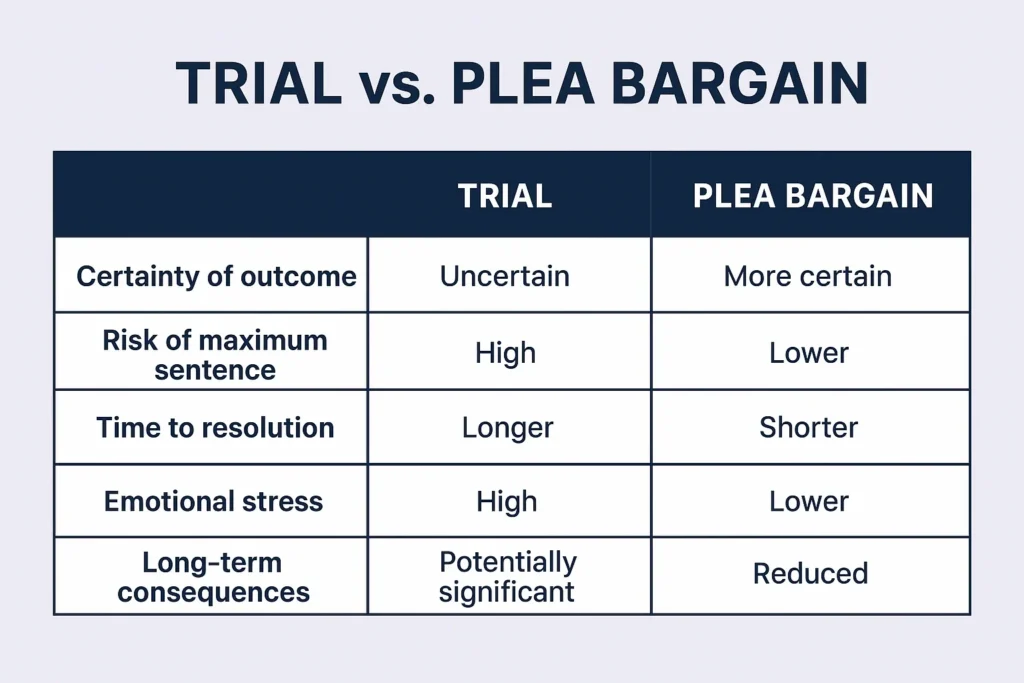Disclaimer: This article provides general legal information about factors commonly evaluated in plea agreements. It does not offer legal advice, and plea agreement procedures vary by jurisdiction.
Plea deals are routine in criminal justice systems, but they carry serious legal implications that extend beyond the courtroom. In fact, approximately 95% of state convictions and 97% of federal convictions are resolved through plea bargains, underscoring the centrality of negotiated pleas to modern criminal justice. Although plea agreements can result in quicker case resolution than trials, they leave defendants making binding decisions that could impact their rights and records, as well as jeopardize future opportunities.
This article provides general legal information about some aspects of plea bargains. It is not legal advice. Criminal law and plea bargaining vary widely from state to state, and you should not rely on this information when making your decision.
How Plea Agreements Work
A plea bargain is an agreement entered into between the prosecution and the defence, and approved by a court, in which a defendant pleads guilty to a reduced charge (or fewer charges) in exchange for more lenient punishment. In return, prosecutors can agree to reduce the charges, drop other counts, or indicate their belief about the sentencing range.
Plea agreements are usually between the prosecution and defense and are subject to judicial approval. And even where both parties consent, a court is tasked with considering the plea and ensuring it was voluntary, intelligent, and legally acceptable. Judges have the legal authority to accept or reject plea agreements.
1. The Strength of the Prosecution’s Case

The strength of the evidence in a case is one of the most significant variables in any plea agreement. Prosecutors are weighing whether the evidence can meet its burden at trial, and defense attorneys are identifying weaknesses, procedural flaws, and legal defenses.
If the evidence is strong and well-documented, plea negotiations will entail greater legal risk if the case proceeds to trial. These dynamics of negotiation may differ when the evidence is weaker. This assessment is a legal one, not predictive, and the results can depend on how evidence has been presented to and interpreted by a court.
2. The Long-Term Consequences of a Conviction

Another critical consideration involves potential sentencing outcomes. Plea agreements are often evaluated by comparing the negotiated sentence to the possible penalties that could apply after a trial conviction. These outcomes depend on statutory limits, sentencing guidelines, and judicial discretion, all of which vary by jurisdiction. A criminal lawyer in Edmonton, for example, can assess how local courts typically apply these factors when advising clients on whether a plea agreement is in their best interest.
Plea deals have long-term implications beyond the immediate sentencing. Criminal convictions can affect job opportunities, professional licenses (such as law or medicine), housing eligibility, and immigration status, depending on local laws. They do frequently have irreversible consequences, so it is essential to understand the bigger picture when it comes to a plea agreement beyond the courtroom, and that’s where an expert criminal lawyer can offer some guidance on what you may be able to expect in your region’s legal environment.
Also Read: How Can a Criminal Conviction Affect Your Life?
Impact on Employment and Career
Plea deals have long-term implications beyond the immediate sentencing. Criminal convictions can affect job opportunities, professional licenses (such as law or medicine), housing eligibility, and immigration status, depending on local laws. They do frequently have irreversible consequences, so it is essential to understand the bigger picture when it comes to a plea agreement beyond the courtroom, and that’s where an expert criminal lawyer can offer some guidance on what you may be able to expect in your region’s legal environment.
Housing and Financial Consequences
Landlords frequently conduct background checks, and a criminal record could make it difficult to find permanent housing. A conviction may also impede your ability to secure loans, mortgages or some government benefits.
Family and Custody Issues
For parents, a criminal record can make custody issues or child support disagreements even more complicated. In some cases, it might even result in the loss of parental rights.
Immigration Concerns
If you are not a citizen, a guilty plea could have immigration consequences, including deportation or denial of future residency or citizenship applications.
Also Read: A List of Crimes That Can Lead to Deportation
Why Awareness Is Key
Because many of these consequences are not explained during plea negotiations, defendants sometimes accept deals without fully understanding the scope of what they are agreeing to. Consulting with an experienced criminal defense lawyer makes certain that you fully understand the ripple effects a guilty plea could have on your life long after the sentence has been served.
3. Your Sentencing Exposure and the Certainty of the Outcome

One of the main reasons defendants consider plea bargains is the predictability they offer. Trials are inherently uncertain, even if you believe you have a strong defense; juries and judges can be unpredictable. If convicted at trial, you could face the maximum sentence allowed by law.
Comparing Plea Deals with Trial Risks
Plea bargains can require defendants to surrender basic rights. That can include the right to a trial, the right to challenge evidence, and the right to cross-examine witnesses. Once a defendant enters a plea, it is very difficult for a court to revoke it.
Plea bargains are generally fixed, and judges require confidence that defendants know what they’re giving up and what could happen if they go through with it. It’s partly what makes plea agreements so solemn an act, and the more reason they should be informed.
Risks and Limitations of Plea Agreements
Plea deals may provide an exit strategy, but they are not without hazard. The vast majority of felony convictions in the United States, often cited as approximately 95% to over 98%, are resolved through plea bargaining rather than jury trials, a reality that can create substantial pressure to settle in exchange for certainty. Individuals may feel compelled to accept agreements even when they could mount a strong defence. Once entered, plea agreements may also limit future legal remedies.
Moreover, in the context of plea bargaining, the expediency of court processing may be valued more highly than a thorough airing of disputed facts. So, extra caution is called for before any agreement is signed.
Why Plea Agreements Differ by Jurisdiction
Plea agreement practices differ significantly based on legal systems, prosecutorial policies, and judicial authority. Differences may exist between state and federal courts, as well as between countries with distinct legal frameworks. Mandatory sentencing laws, court discretion, and procedural rules all influence how plea agreements are structured and reviewed.
Because of this variability, general explanations cannot replace jurisdiction-specific legal guidance.
Conclusion
Plea agreements are serious legal matters with long-term consequences, and it is critical that you fully understand the rights you are surrendering. Knowing how plea bargains operate and the factors they usually consider can help explain why these decisions are so momentous.
As such, informed legal counsel should continue to play a significant role in plea negotiations as each jurisdiction has its own laws and procedures. An intelligent and conscious contemplation of the long-term consequences is at the heart of responsible decision-making in any plea bargain negotiation.












